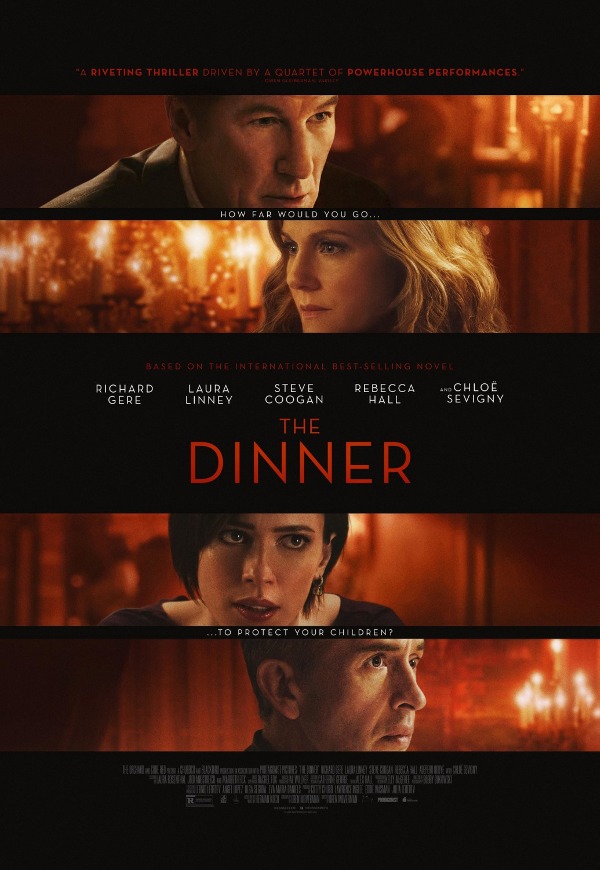- Title: The Dinner
- IMDb: link

 Writer/director Oren Moverman‘s film, based on the novel by Herman Koch, is a claustrophobic acting exercise that would seem to be more at home on stage than in a movie theater. The film centers around four unlikable people brought together at a ridiculously posh restaurant discussing, or rather talking around and avoiding discussing, events of recent days concerning a horrible act committed by the two couples’ teenage sons. The more time we spend with the two couples and their sons the less likely we are to care what happens to anyone involved.
Writer/director Oren Moverman‘s film, based on the novel by Herman Koch, is a claustrophobic acting exercise that would seem to be more at home on stage than in a movie theater. The film centers around four unlikable people brought together at a ridiculously posh restaurant discussing, or rather talking around and avoiding discussing, events of recent days concerning a horrible act committed by the two couples’ teenage sons. The more time we spend with the two couples and their sons the less likely we are to care what happens to anyone involved.
Our cast includes Congressman Stan Lohman (Richard Gere) and his second wife Katelyn (Rebecca Hall), the politician’s brother Paul (Steve Coogan), a former teacher suffering from some form of early-onset dementia, and his wife Claire (Laura Linney). Other characters come and go including various wait staff (Michael Chernus, among others), Stan’s ex-wife (Chloë Sevigny), and the politician’s aides (most notably Adepero Oduye), but everyone aside from these four core characters (including the flashbacks to the boys themselves) prove to be superfluous to the plot.
With a two-hour running time the simple set-up runs out of gas long before the credits begin to roll. The film is notable for the performances of its leads. While none are award-worthy stand-outs, Gere, Coogan, Linney, and Hall all find moments to shine in an otherwise pointless exercise. We’re given no reason to care for either couple or their sons, and the revelation of the two boys’ actions certainly does nothing to endear them to us. The addition of the adopted black child of one of the couples is used as a tawdry plot device that only further cements the characters as, to put it bluntly, selfish yuppie scum. While not pointlessly dragging out the real discussion, the script force-feeds us helpings of pretentious white guilt and privilege as characters argue the morality of letting their kids get away with a heinous crime.
Other than its cast, the film’s biggest asset is juxtaposition of the forced meeting versus the extravagant setting. Unfortunately every time a character leaves the table the tension is broken. Had the story been adapted as a play, characters moving off-stage for another purpose would be ignored keeping the audience’s attention on the slow-boiling cauldron of the dinner table. Instead the camera follows each character as they remove themselves from the dinner, immediately breaking the claustrophobic bubble which should serve the story far better than it does. While the set-up may bring comparisons to Who’s Afraid of Virginia Woolf, the results are far less interesting. We have no driving devil to push the limits of the story, only a sad sack of self-righteous characters, and Moverman’s choices prevent the tension of the story from building on itself into a grand crescendo.

I guess I won’t be seeing this one.